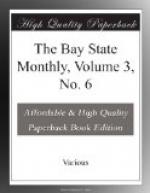In 1863 and 1864 Mr. Paine was nominated, without his consent, by the Democratic party of Massachusetts, a candidate for the office of Governor. With much reluctance he accepted the nomination, but, as he expected, and doubtless to his joy, failed of an election. In 1867, on the resignation of Chief Justice Bigelow, the office of Chief Justice of the Supreme Court of Massachusetts was offered by Governor Bullock to Mr. Paine, who, not wishing to give up his large and profitable practice at the bar, declined to accept. This decision, though a natural one, is much to be regretted by the citizens of this state. Coming from an eminently judicial mind, his decisions, had he sat on the bench, would have been models of close, cogent reasoning, clearness, and brevity, worthy of the best days of the Massachusetts judiciary.
Shortly after his removal to this State Mr. Paine was associated with Rufus Choate and F.O.J. Smith in the defence of Judge Woodbury Davis, of Portland, Maine, who had been impeached by the Legislature of that State for misconduct in his judicial office. In an editorial article upon the trial, which appeared after its termination, in the Kennebec Journal, published at Augusta, the Hon. James G. Blaine, the writer, declared epigrammatically that, in the defence of Judge Chase, “Paine furnished the logic, Choate the rhetoric, and Smith the slang.”
From 1872 to 1883 Mr. Paine was Lecturer on the Law of Real Property at the Law School of the Boston University, an office whose duties he performed with great credit to himself, and profit to those whom he addressed. So thoroughly was he master of his subject, difficult and intricate as it confessedly is, that in not a single instance, except during the lectures of the last year, did he take a note or scrap of memoranda into the class room.
While he has always been a close and devoted student of the law, Mr. Paine has yet found time for general reading, and has hung for many an hour over the pages of the English classics with keen delight. For Homer and Virgil he still retains the relish of his early days, and, in the intervals of professional toil, has often slaked his thirst for the waters of Helicon in long and copious draughts. How well he appreciated the advantages of an acquaintance with literature, he showed early in a suggestive and instructive lecture on “Reading,” which we heard him deliver before the Lyceum at Hallowell more than forty years ago. With his lamented friend Judge B.F. Thomas, he believes that a man cannot be a great lawyer who is nothing else,—that exclusive devotion to the study and practice of the law tends to acumen rather than to breadth, to subtlety rather than to strength. “The air is thin among the apices of the law, as on the granite needles of the Alps. Men must find refreshment and strength in the quiet valleys at their feet.”




